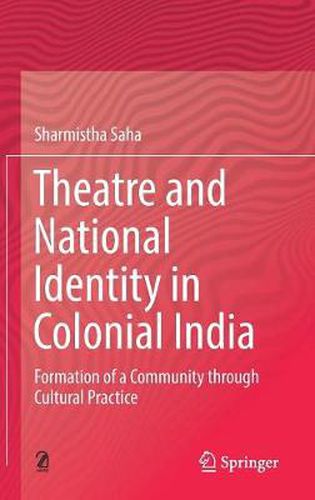Readings Newsletter
Become a Readings Member to make your shopping experience even easier.
Sign in or sign up for free!
You’re not far away from qualifying for FREE standard shipping within Australia
You’ve qualified for FREE standard shipping within Australia
The cart is loading…






This title is printed to order. This book may have been self-published. If so, we cannot guarantee the quality of the content. In the main most books will have gone through the editing process however some may not. We therefore suggest that you be aware of this before ordering this book. If in doubt check either the author or publisher’s details as we are unable to accept any returns unless they are faulty. Please contact us if you have any questions.
This book critically engages with the study of theatre and performance in colonial India, and relates it with colonial (and postcolonial) discussions on experience, freedom, institution-building, modernity, nation/subject not only as concepts but also as philosophical queries. It opens up with the discourse around ‘Indian theatre’ that was started by the orientalists in the late 18th century, and which continued till much later. The study specifically focuses on the two major urban centres of colonial India: Bombay and Calcutta of the 19th and early 20th centuries. It discusses different cultural practices in colonial India, including the initiation of ‘Indian theatre’ practices, which resulted in many forms of colonial-native ‘theatre’ by the 19th century; the challenges to this dominant discourse from the ‘swadeshi jatra’ (national jatra/theatre) in Bengal, which drew upon earlier folk and religious traditions and was used as a tool by the nationalist movement; and the Indian People’s Theatre Association (IPTA) that functioned from Bombay around the 1940s, which focused on the creation of one national subject - that of the ‘Indian’. The author contextualizes the relevance of the concept of ‘Indian theatre’ in today’s political atmosphere. She also critically analyses the post-Independence Drama Seminar organized by the Sangeet Natak Akademi in 1956 and its relevance to the subsequent organization of ‘Indian theatre’. Many theatre personalities who emerged as faces of smaller theatre committees were part of the seminar which envisioned a national cultural body.
This book is an important contribution to the field and is of interest to researchers and students of cultural studies, especially Theatre and Performance Studies, and South Asian Studies.
$9.00 standard shipping within Australia
FREE standard shipping within Australia for orders over $100.00
Express & International shipping calculated at checkout
This title is printed to order. This book may have been self-published. If so, we cannot guarantee the quality of the content. In the main most books will have gone through the editing process however some may not. We therefore suggest that you be aware of this before ordering this book. If in doubt check either the author or publisher’s details as we are unable to accept any returns unless they are faulty. Please contact us if you have any questions.
This book critically engages with the study of theatre and performance in colonial India, and relates it with colonial (and postcolonial) discussions on experience, freedom, institution-building, modernity, nation/subject not only as concepts but also as philosophical queries. It opens up with the discourse around ‘Indian theatre’ that was started by the orientalists in the late 18th century, and which continued till much later. The study specifically focuses on the two major urban centres of colonial India: Bombay and Calcutta of the 19th and early 20th centuries. It discusses different cultural practices in colonial India, including the initiation of ‘Indian theatre’ practices, which resulted in many forms of colonial-native ‘theatre’ by the 19th century; the challenges to this dominant discourse from the ‘swadeshi jatra’ (national jatra/theatre) in Bengal, which drew upon earlier folk and religious traditions and was used as a tool by the nationalist movement; and the Indian People’s Theatre Association (IPTA) that functioned from Bombay around the 1940s, which focused on the creation of one national subject - that of the ‘Indian’. The author contextualizes the relevance of the concept of ‘Indian theatre’ in today’s political atmosphere. She also critically analyses the post-Independence Drama Seminar organized by the Sangeet Natak Akademi in 1956 and its relevance to the subsequent organization of ‘Indian theatre’. Many theatre personalities who emerged as faces of smaller theatre committees were part of the seminar which envisioned a national cultural body.
This book is an important contribution to the field and is of interest to researchers and students of cultural studies, especially Theatre and Performance Studies, and South Asian Studies.